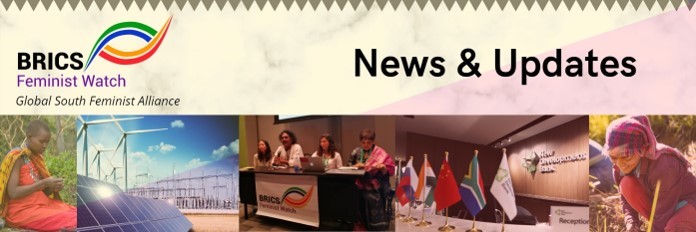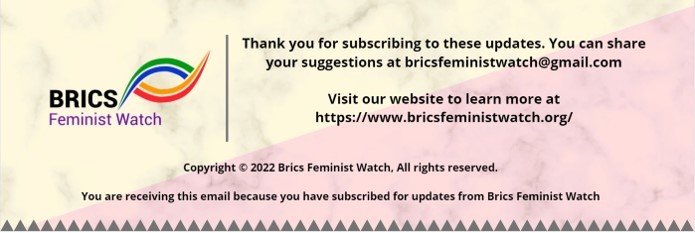Women and G20: Why gendering clean energy and debt treatment is important for inclusive multilateral governance?

Zainab Akhtar (Communication lntern - BRICS Feminist Watch and PWESCR) with inputs from Madhurima Das (Communication Officer -BRICS Feminist Watch and PWESCR
Perfecting an imperfect framework: G20's shortcomings and thematic suggestions
G20 is an intergovernmental organization, consisting of 19 states and European Union (EU). At the time of its inception, G20 was mainly concerned with coordinating response to global fiscal and economic issues, but since then its scope has expanded enormously. Now, issues like climate change, trade, environment, energy etc also соте under its amblt. The success of G20 depends on dealing with all these issues in an inclusive manner. But incLusivity has not been а strength of G20. Many global South countries remain excluded from its membership. Western powers i.e., EU and America have wielded more power over agendasetting in G20. (Jokela 2011). Moreover, there is а marked silence in the G20 framework regarding gender. The macro-economic policies that the group promotes such as 'fiscal consolidation' and 'restrictive monetary policy' are gender-Ыind insofar it resorts to public spending cuts whiLe ignoring its gendered consequences (Heintz 2013).
The line-up of upcoming G20 presidencies provide а striking opportunity for the Global South to address these shortfalls.
The baton of leadership will Ье passed from lndonesia to lndia, then to Brazil and finally to South Africa. The Global South thus has an exceptionaL chance to incorporate their problems into mainstream G20 discourse with а particuLar focus оn women's issues from the South. lndia, which will assume G20 presidency in December 2022 has its work cut out. lts presidency comes at а time when the world is caught up in geopolitical conflicts and economies are struggling with post-covid recovery and the aftereffects of the Russian invasion. lt will Ье the ultimate test of lndian diplomacy, leadership and vison, to ensure that:
• Dialogue between G20 states is sustained;
• North-South parity is addressed and; with South agenda and issues put at the core
• Gender is mainstreamed
Transition to clean energy is important to achieve net zero emissions, а clean and healthy environment and to meet rising energy demands sustainaby. But while developing and emerging economies will contribute to around 70% of the global increase in energy demand, they have not seen а concomitant increase in clean energy investments (IEA, 2021). Lack of investments mean that the расе of clean energy transition in these economies will bе slow.
Around 2.8 billion peopLe do not have access to clean cooking technologies, particularly in rural sub-Saharan Africa and Asia-Pacific.
The gendered cost of debt crisis
А severe debl crisis has engulfed the developing world, exacerbated Ьу the pandemic and the Russian invasion. Pandemic led to а decLine in the foreign exchange earnings of deveLoping economies due to fall in export revenue, tourism, remittances and foreign investments. While advanced economies like US have been аЫе to shore up the post-covid economic crisis Ьу heavy puЫic spending, developing economies cannot afford to do the same. ln many countries, the pandemic aggravated an already poor debl situation (Frankel 2020). The Russian invasion and supply chain disruptions led to high food and fuel inflation which the advanced economies dealt with Ьу hiking interest rates. This has raised the cost of borrowing for developing countries, made imports more expensive and spiralled them into deeper debl (United Nations 2022).
As the developing world slides into а financial quicksand, how has this economic turmoil impacted women? There are multiple layers to this answer. Firstly, austerity measures have been gender-blind and hurt women more. The debl servicing conditions imposed Ьу IMF and World Bank leads to cuts in sociaL spending оп weLfare programs for chiLdren, eLderLy and women. This translates into increased care responsiblLities for women and puts their own 'welfare, nutrition and educational status' at risk (UNAIDS 2012, 6-8). Secondly, patriarchal norms and gender рау gap at the workplace imply that women are more prone to economic vuLnerablLity and job Loss during financial crisis. (UNAIDS 2012, 7) Thirdly, gender inequaLities get reinforced within househoLds. Meagre supplies mean that women end up prioritizing food access for male members and children (UNAIDS 2012, 8). Lastly, due to financial crunch, the immediate concern with reviving the economy tends to push women further out of the state's priority focus
(UNAIDS 2012, 7). As the upcoming G20 president and а developing country itself, it is vital that lndia discontinues the Long tradition of gender-blind approaches in debt response.
This is bу no means an easy task, given the tardy operationalization of existing G20 debl response frameworks i.e., Common Framework for DeЬt treatment beyond the DSSI. Al though it sought to build up on the deficiencies of Debl Service Suspension lnitiative (DSSI), one key lacuna i.e., enforcing the participation of private creditors has remained unresolved
(Ahmed and Brown 2022). А big challenge for the lndian presidency is therefore to ensure that the deLivery of the common framework is made effective. Any reform of the framework should foremostly focus on mandating the participation of private creditors - the benefit of debl restructuring or deferral will Ье futile if the money saved goes to service the debl owed bу private creditors.
Going over the history of G20, one can observe the prevalence of interestbased multilateralism. ln simple terms it means that major powers (US and EU) used G20 to fulfil their 'particular interests', instead of emphasizing on the 'common global responsiЬilities' of all states. Now, the chaLLenge for lndia is to buiLd back а 'norms-based muLtiLateraLism' (Jokela 2011). Ву bringing forth а gendered perspective on clean energy and debl treatment, lndia will have the opportunity to evolve а multilateralism that is inclusive and people-oriented.



